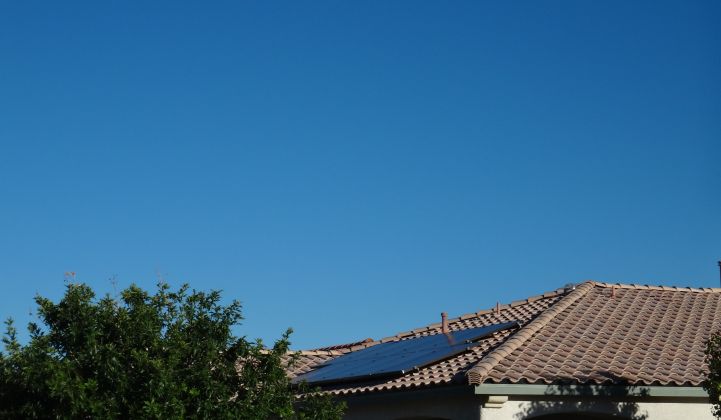The Public Utilities Commission of Nevada voted unanimously on Friday to transition rooftop solar customers onto contentious new rate plans over 12 years, rejecting requests from NV Energy and solar advocates to approve a more generous 20-year transition period.
The change applies to both existing and new solar customers, building on a draft rule issued this week, thanks to a last-minute proposal put forward by Chairman Paul Thomsen.
“I think this proposal creates a seamless transition to cost-based rates,” Thomsen said, according to the Las Vegas Review Journal.
NV Energy did not immediately respond to request for comment, but the utility recently lobbied to keep Nevada’s 17,000 existing solar customers on the old rates for up to 20 years.
The PUC initially approved new rates for rooftop solar customers in late December, which came into effect on January 1 and were designed to phase in over four years. The vote today maintains the year-one changes under the initial ruling -- a fixed charge increase from $12.75 to $17.90 per month and a 2-cent reduction in net metering compensation.
However, the next rate change has been pushed back from January 1, 2017 to January 1, 2019. Subsequent rate increases will now take place in three-year increments.
Thomsen said his proposal would eliminate two-thirds of a $315 million subsidy solar owners receive from non-solar customers over the 12-year period. The PUC maintains that the rate changes are needed to eventually eliminate a $16 million annual cost shift.
Rooftop solar companies and customers reject the notion that there is a cost shift, and say the amendment doesn’t go far enough to undo the harm caused by the new rates.
“They gave us some crumbs to shut us up, but we’re still never going to recoup our money,” said Nevada solar owner Dale Matz, in an interview.
“It’s the death of the future of solar,” he added. “No one is going to invest money in solar now knowing they're not going to get it back.”
“Instead of a quick death for solar, they’re making it bleed to death, and it hurts the consumers that are shackled to NV Energy,” echoed Debbie Dooley, leader of the Green Tea Coalition, a free-market conservative group that has been a vocal supporter of pro-solar policies across the country.
Research models show that the rates approved in December will erase monthly savings for virtually all Nevada solar customers. Given that rooftop systems have a lifetime of 20 to 30 years, the 12-year grandfathering provision effectively delays the inevitable, said Chandler Sherman, public affairs manager for SolarCity.
“It’s still a really, really bad deal to go solar in Nevada,” she said, noting that customers will still have to pay an additional $8,000-$9,000 over the lifetime of their system.
“The industry still can’t operate and the jobs can’t come back until the rules are actually fixed,” she added. Nevada has already lost more than 1,000 jobs as both national and local installers have laid off workers in response to the new policy.
The perceived heavy-handedness of the decision is likely to add momentum to a ballot measure pending before the Nevada Secretary of State that would overturn the PUC’s original ruling. The ballot initiative is being led by the Bring Back Solar Alliance, a coalition made up of solar companies, solar workers and nonprofits.
The group announced on Friday that it has already collected the 55,000 signatures needed to secure a place on the statewide ballot on November 8.
“This incredible show of support, which we have captured through in-person and online commitments to support our efforts, provides another reminder that fully 89 percent of Nevadans believe that the Public Utilities Commission made the wrong decision when it ended net metering, refused to grandfather existing solar customers at their current rates, and destroyed one of the fastest-growing solar sectors in the country,” said Bob Greenlee, spokesperson for the Bring Back Solar Alliance, in a statement ahead of the PUC vote.
Following the vote, Greenlee said the Alliance is urging the state legislature to call a special session to resolve the rooftop solar issue. If that fails, the group will continue to press forward with the referendum.
Under state law, parties opposing this referendum have until Tuesday, February 16 to challenge the language in state court, according to Rob Rains of the policy research firm Washington Analysis.
“Should it be taken up, it would result in an expedited Nevada district court proceeding that would likely be concluded by Q2,” he wrote in an e-mail. “Appeal of that ruling would next go to the state Supreme Court, and could be decided by late summer, likely in time for the election. So long as the language satisfies the state’s guidelines, it should qualify for the ballot.”



